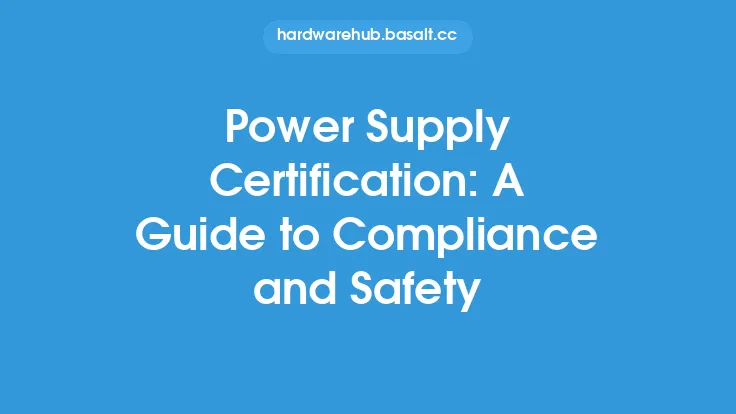Power supply certification and regulatory compliance are crucial aspects of the power supply industry, ensuring that products meet specific safety, performance, and environmental standards. The process of obtaining certification involves a series of tests and evaluations, which verify that a power supply unit (PSU) complies with the requirements of various regulatory bodies and industry standards. In this article, we will delve into the world of power supply certification, exploring the key aspects, benefits, and challenges associated with this complex process.
Introduction to Power Supply Certification
Power supply certification is a critical step in the development and manufacturing of power supplies. It involves a series of tests and evaluations that verify a PSU's compliance with specific safety, performance, and environmental standards. The certification process typically involves third-party testing and validation, which provides an independent assessment of a PSU's quality and reliability. The primary goal of power supply certification is to ensure that products meet the required standards, minimizing the risk of electrical shock, fire, or other hazards.
Types of Power Supply Certifications
There are several types of power supply certifications, each with its own set of requirements and standards. Some of the most common certifications include:
- 80 Plus certification, which focuses on energy efficiency and power quality
- UL (Underwriters Laboratories) certification, which emphasizes safety and compliance with North American standards
- CE (Conformité Européene) certification, which is required for products sold in the European Union and focuses on safety, health, and environmental protection
- FCC (Federal Communications Commission) certification, which regulates electromagnetic interference (EMI) and radio-frequency interference (RFI) in the United States
- ETL (Intertek) certification, which is similar to UL certification and provides an alternative testing and certification option
- ISO 9001 certification, which focuses on quality management and is often required for power supply manufacturers
The Certification Process
The certification process typically involves several stages, including:
- Design review: The manufacturer submits design documents and specifications for review by the certification body.
- Testing and evaluation: The PSU is subjected to a series of tests, which may include safety tests, performance tests, and environmental tests.
- Sample selection: The certification body selects samples of the PSU for testing and evaluation.
- Test report review: The certification body reviews the test reports to ensure that the PSU meets the required standards.
- Certification issuance: If the PSU meets the required standards, the certification body issues a certificate of compliance.
Benefits of Power Supply Certification
Power supply certification offers several benefits, including:
- Enhanced safety: Certification ensures that products meet specific safety standards, minimizing the risk of electrical shock, fire, or other hazards.
- Improved performance: Certification verifies that products meet specific performance standards, ensuring reliable operation and minimizing the risk of downtime or data loss.
- Increased customer confidence: Certification provides an independent assessment of a product's quality and reliability, increasing customer confidence and trust.
- Regulatory compliance: Certification ensures that products comply with relevant regulations and standards, reducing the risk of non-compliance and associated penalties.
Challenges and Considerations
Despite the benefits of power supply certification, there are several challenges and considerations that manufacturers must address. These include:
- Cost and time: The certification process can be time-consuming and costly, requiring significant resources and investment.
- Complexity: The certification process involves a complex series of tests and evaluations, which can be challenging to navigate.
- Regulatory requirements: Manufacturers must ensure that their products comply with relevant regulations and standards, which can be subject to change or revision.
- Market requirements: Manufacturers must also consider market requirements and customer expectations, which can influence the certification process and product design.
Best Practices for Power Supply Certification
To ensure successful power supply certification, manufacturers should follow best practices, including:
- Early engagement: Engage with the certification body early in the design process to ensure that products meet the required standards.
- Design for certification: Design products with certification in mind, taking into account the specific requirements and standards.
- Testing and evaluation: Conduct thorough testing and evaluation to ensure that products meet the required standards.
- Documentation and record-keeping: Maintain accurate documentation and records, including test reports and certification documents.
- Ongoing compliance: Ensure ongoing compliance with relevant regulations and standards, including any changes or revisions.
Conclusion
Power supply certification and regulatory compliance are critical aspects of the power supply industry, ensuring that products meet specific safety, performance, and environmental standards. By understanding the certification process, types of certifications, and benefits of certification, manufacturers can ensure that their products meet the required standards, minimizing the risk of non-compliance and associated penalties. By following best practices and engaging with the certification body early in the design process, manufacturers can navigate the complex certification process and bring high-quality, reliable products to market.





